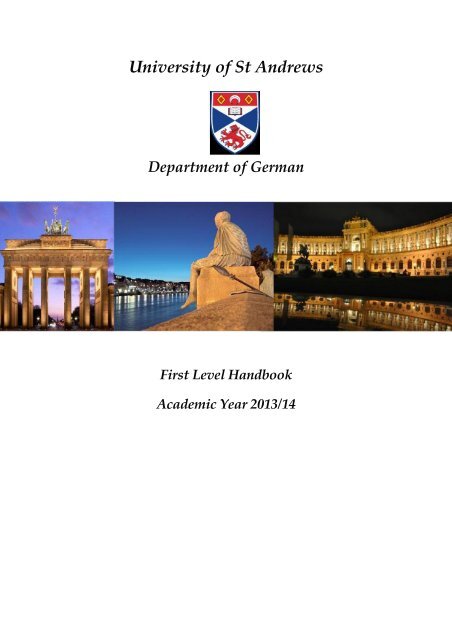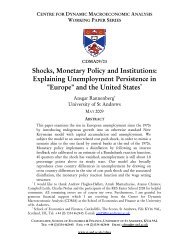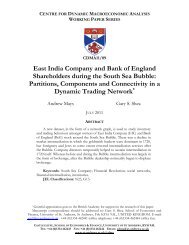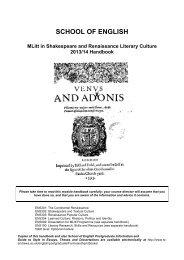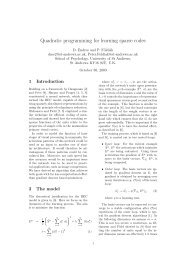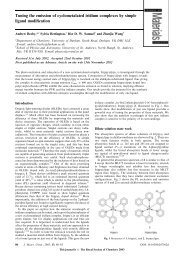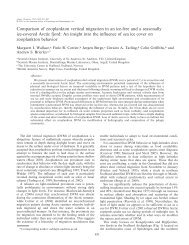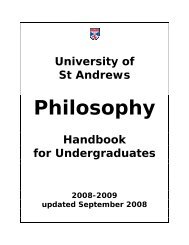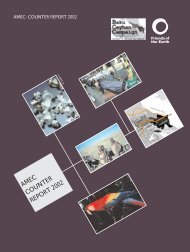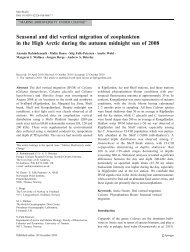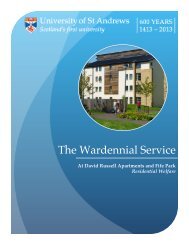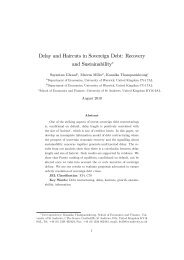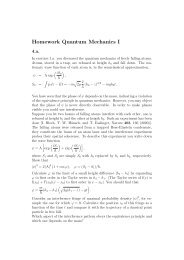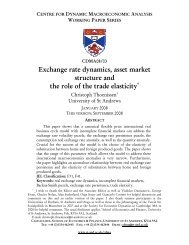Level 1000 German Handbook 2013/14 - University of St Andrews
Level 1000 German Handbook 2013/14 - University of St Andrews
Level 1000 German Handbook 2013/14 - University of St Andrews
You also want an ePaper? Increase the reach of your titles
YUMPU automatically turns print PDFs into web optimized ePapers that Google loves.
<strong>University</strong> <strong>of</strong> <strong>St</strong> <strong>Andrews</strong><br />
Department <strong>of</strong> <strong>German</strong><br />
First <strong>Level</strong> <strong>Handbook</strong><br />
Academic Year <strong>2013</strong>/<strong>14</strong>
CONTENTS<br />
1. Introduction<br />
2. Glossary<br />
3. <strong>German</strong> Courses: <strong>St</strong>ructure, Content, and Bibliography<br />
4. Learning Advice and Regulations<br />
5. Assessment Criteria<br />
6. Marking Scales<br />
7. Pathways into Second-<strong>Level</strong> <strong>German</strong><br />
8. Guide to Essay-Writing<br />
9. Guide to Referencing in Essay-Writing<br />
10. Members <strong>of</strong> <strong>St</strong>aff<br />
11. Leading Dates<br />
12. Further Information
1<br />
1. INTRODUCTION<br />
The Department <strong>of</strong> <strong>German</strong> is a flourishing and active community with an intake <strong>of</strong><br />
around 80-100 undergraduates a year and a growing postgraduate presence. It<br />
was ranked first in Scotland and second equal in the UK in the RAE<br />
(Research Assessment Exercise) 2008; it was ranked second in The Complete<br />
<strong>University</strong> Guide 2010. With five members <strong>of</strong> permanent staff, a mixture <strong>of</strong> young and<br />
established scholars, a proven track record <strong>of</strong> teaching excellence and cutting-edge<br />
research in a number <strong>of</strong> disciplines, <strong>St</strong> <strong>Andrews</strong> is one <strong>of</strong> the few institutions in the UK<br />
able to <strong>of</strong>fer such an imaginative, challenging, modern and diverse approach to the<br />
study <strong>of</strong> <strong>German</strong>.<br />
At the heart <strong>of</strong> our undergraduate curriculum is a specially designed language<br />
teaching programme that caters for students who have already studied <strong>German</strong> as a<br />
main subject at school and for students who have done little or no <strong>German</strong> before<br />
they come to university. In addition, students at <strong>St</strong> <strong>Andrews</strong> have scope to<br />
follow their own particular interests by choosing from a broad range <strong>of</strong> course<br />
options that reflect and explore the enormously rich cultural heritage <strong>of</strong> the<br />
<strong>German</strong>-speaking lands, including: medieval studies, literature & society from the<br />
eighteenth century to the present day, linguistics, film and intellectual history.<br />
<strong>German</strong>y today is the political, economic, artistic and intellectual powerhouse <strong>of</strong> the<br />
European Union. Yet <strong>German</strong> is spoken not only in the Federal Republic, but in<br />
Austria, Switzerland and by minorities in several other countries as well.<br />
Knowledge <strong>of</strong> the mother tongue <strong>of</strong> 100 million people has never been more<br />
important for governments, businesses and private citizens, and students <strong>of</strong> <strong>German</strong><br />
are therefore consistently amongst the most sought-after graduates for major<br />
employers.
2<br />
2. GLOSSARY: SOME USEFUL TERMS<br />
New students scanning notices and timetables may find the jargon <strong>of</strong> the<br />
Department puzzling at first. Here is a short glossary:<br />
Assessed means that a piece <strong>of</strong> coursework counts towards your marks and<br />
grading for the module as a whole. "Unassessed" exercises will be given a mark<br />
too, but it does not count towards the course work mark.<br />
CALL stands for "computer-assisted language learning". Increasingly, computers are<br />
being used especially to provide support practice in language learning. In <strong>St</strong><br />
<strong>Andrews</strong> we regard them as a valuable ancillary tool, not as a substitute for faceto-face<br />
learning. CALL may be tutored or self-access.<br />
Class hour is the hour at which on each day <strong>of</strong> the week the <strong>German</strong> Department<br />
has the right to hold classes in particular modules and has priority over other<br />
departments in requiring your attendance.<br />
Course is an ambiguous term! It means a component or strand <strong>of</strong> a module, such as<br />
Language or Literature in module GM1001. It is also used to denote a student's<br />
overall programme <strong>of</strong> study in a subject, as in "the <strong>German</strong> course at <strong>St</strong> <strong>Andrews</strong>".<br />
Groups are the units we allocate you to when we subdivide the students taking<br />
GM1001 for tutorial or seminar teaching. For Language and Literature your<br />
groups are likely to consist <strong>of</strong> between 12 and 16 students. Some groups will meet in<br />
the class hour, when all students are able to attend. Other groups have to meet at<br />
times outside the class hour.<br />
Lectures are formal presentations to all students taking a module. The lecturer will<br />
give a prepared talk, and you should take notes so that you have a record <strong>of</strong> the<br />
important points. Your notes will be useful when you come to write an essay or<br />
revise for an exam. You may be given a handout with illustrative or additional<br />
material or even a summary <strong>of</strong> the lecture. The lecturers may ask occasional<br />
questions, or invite you to put questions to them, but the element <strong>of</strong> interaction is<br />
relatively small as compared with a tutorial or seminar.<br />
Seminar is a teaching group <strong>of</strong> roughly 12-20 students. It will tend to be quite<br />
formally organised, with students preparing tasks or presentations individually or in<br />
pairs.<br />
Sprachwerkstatt is a series <strong>of</strong> drop-in language sessions for <strong>German</strong> students <strong>of</strong> all<br />
levels. <strong>St</strong>udents do not have to register to take part in the Sprachwerkstatt. Each<br />
Sprachwerkstatt session focuses on one particular aspect <strong>of</strong> grammar or<br />
pronunciation and this programme is a quick and easy way to revise some basic
3<br />
grammar points. The semester programme <strong>of</strong> the Sprachwerkstatt is posted on<br />
all the notice boards and students are also notified by email. These sessions take<br />
place throughout the academic year on Fridays, 3 pm.<br />
Tutorials are what make university university. They are teaching groups <strong>of</strong><br />
roughly 10-15 students. Less structured than a seminar, they are nonetheless<br />
based on questions and topics given out in advance. You must prepare<br />
thoroughly for tutorials because you, not the tutor, provide the answers.<br />
Tutorials work best when they target problems or things you do not understand,<br />
so make sure you answer the questions in as much detail as you can before the<br />
tutorial, looking up anything you do not know. The language course will have<br />
elements <strong>of</strong> tutorial and seminar, depending on the programme in a particular<br />
hour.
4<br />
3. GERMAN COURSES: STRUCTURE AND CONTENT<br />
In order to gain entry into Second-<strong>Level</strong> <strong>German</strong>, you must obtain 40 credits in<br />
<strong>German</strong> in your first year. Depending on your entry qualifications, students have the<br />
choice <strong>of</strong> the following two different courses in <strong>German</strong>*:<br />
First <strong>Level</strong> <strong>German</strong> A<br />
First <strong>Level</strong> <strong>German</strong> B<br />
Module<br />
codes<br />
GM1001/2<br />
GM1003/4<br />
Entry<br />
requirements<br />
Prescribed<br />
books<br />
SCE Higher, A-<strong>Level</strong> <strong>German</strong> or<br />
equivalent<br />
Koithan et al., Aspekte Lehrbuch 1 +<br />
Arbeitsbuch 1 (Langenscheidt) (ohne<br />
DVD)<br />
+ literary texts (see set texts)<br />
no formal qualifications required<br />
Moeller et al., Deutsch heute, 9 th<br />
edition.<br />
International edition.<br />
Credits<br />
Class hour<br />
Assessment and<br />
examination<br />
total <strong>of</strong> 40 credits (20 credits per module)<br />
GM1001/2:<br />
1 Literature lecture (3 pm<br />
Tuesday) +<br />
1 Lit. tutorial (choices given) +<br />
2 Language classes (choices given)<br />
1 grammar lecture (4pm)<br />
3 tutorials<br />
semester 1: course work (40%)+ 2-hour written end-<strong>of</strong>-semester<br />
examination (60%)<br />
semester 2: course work (40%) + 2-hour written end-<strong>of</strong>semester<br />
examination (60%)<br />
*We strongly encourage you to spend a year in a <strong>German</strong>-speaking country between your Second<br />
<strong>Level</strong> and Honours courses, working as an English-language Assistant in a <strong>German</strong> or Austrian<br />
school, or by spending the year as an Erasmus exchange student in <strong>German</strong>y or Austria, taking<br />
assessed courses (worth 120 Honours credits). Our Erasmus partners are the Universities <strong>of</strong> Bonn and<br />
Vienna. First <strong>Level</strong> <strong>German</strong> B students must normally spend the third year <strong>of</strong> their degree course as<br />
English Language Assistants in a <strong>German</strong>-speaking country. For academic reasons they may be given<br />
approval for the Erasmus option with excellent marks. After an assistantship year you would return<br />
to <strong>St</strong> <strong>Andrews</strong> for two years <strong>of</strong> Honours study (Junior and Senior Honours). On your return from an<br />
Erasmus year you would join the Senior Honours class.
5<br />
<strong>German</strong> Language<br />
First <strong>Level</strong> <strong>German</strong> A<br />
GM1001/2<br />
In a twice-weekly class students will follow an integrated course, designed to<br />
develop students' skills in reading and understanding <strong>German</strong> texts, presenting their<br />
thoughts and ideas in <strong>German</strong>, both in writing and speech, and to help students<br />
consolidate their grasp <strong>of</strong> the grammar <strong>of</strong> <strong>German</strong>. These activities will be based<br />
on and develop out the following course book which needs to be purchased:<br />
Ute Koithan et.al., Aspekte Mittelstufe Deutsch Lehrbuch 1 + Arbeitsbuch 1<br />
(Langenscheidt).<br />
If you are going to continue with <strong>German</strong> it is essential to purchase a good,<br />
large dictionary such as:<br />
Either Collins <strong>German</strong>/English, English/<strong>German</strong> Dictionary<br />
or Oxford-Duden <strong>German</strong> Dictionary<br />
or Learner’s Dictionary (Hueber)<br />
Please do not buy the smaller, "concise" versions <strong>of</strong> these dictionaries if you wish to<br />
continue <strong>German</strong>.<br />
For grammar books and other items, please see the bibliography below.<br />
Outside the classroom:<br />
In the course <strong>of</strong> the first weeks <strong>of</strong> your studies you will be notified that you have<br />
to complete and submit the so-called skillswork – a document which contains<br />
several questions related to your studies and the School <strong>of</strong> Modern Languages.<br />
This exercise should help you to get to know the departments, the library and<br />
familiarize you with important learning resources. This is a compulsory element<br />
for ALL students enrolled in a First Year Module. (DEADLINE for<br />
SUBMISSION: 01.11.<strong>2013</strong>)<br />
The <strong>German</strong> Department <strong>of</strong>fers a series <strong>of</strong> weekly Sprachwerkstatt tutorials; see<br />
noticeboard for times. Within these classes we tackle skills needed to study and<br />
carry out research in languages at university. In the first three classes, which are<br />
compulsory for students enrolled in GM1001, we work on learning strategies,<br />
writing and reading skills. This should give you a better idea <strong>of</strong> what is expected<br />
from you as a First Year student. The subsequent sessions are dedicated to more<br />
specific grammar or pronunciation topics and are highly recommended.<br />
To do well in the course (and to make a real difference to your <strong>German</strong>) it is<br />
imperative that you work independently in areas which are especially<br />
important for you. On Moodle (Virtual Learning Environment) you will find a
6<br />
data bank with exercises and quizzes for important grammar and vocabulary<br />
topics which are relevant in your first year. The grammar exercises cover topics<br />
which you might already know, but should be practised and consolidated. The<br />
vocabulary section tackles words and expressions from the basic vocabulary<br />
topics <strong>of</strong> the <strong>German</strong> language. These exercises are in addition to your regular<br />
language classes and we highly recommend that you make use <strong>of</strong> this resource<br />
and complete them all.. The exercises will be accessible throughout the year and<br />
can be completed at any time.<br />
<strong>German</strong> Literature<br />
The course will introduce you to techniques <strong>of</strong> understanding and analysing<br />
literary texts (prose, poetry and drama) and linguistic patterns. You will also<br />
gain an overview <strong>of</strong> <strong>German</strong> studies in the various aspects you will encounter in<br />
the course <strong>of</strong> your degree programme: the study <strong>of</strong> linguistics, medieval culture,<br />
modern literature and history <strong>of</strong> ideas.<br />
Each week you will have a lecture and a tutorial. The lectures will give you an<br />
overview <strong>of</strong> each topic and acquaint you with key concepts. Tutorials will allow<br />
you to take up in greater detail the issues raised in lectures. Tutorials are your<br />
opportunity to ask questions and to develop your understanding. You will be<br />
expected to read the set texts in advance <strong>of</strong> the classes and to prepare tasks and<br />
questions for tutorial discussion.<br />
Set Texts:<br />
IT IS ESSENTIAL THAT YOU BUY YOUR OWN COPY OF THE<br />
EDITION LISTED.<br />
Semester 1:<br />
Erpenbeck, Jenny, Geschichte vom alten Kind (btb Verlag, 2001).<br />
Kafka, Franz, Das Urteil (provided by the department)<br />
Schnitzler, Arthur, Fräulein Else (<strong>St</strong>uttgart: Reclam, 2001)<br />
Hartmann von Aue, Der arme Heinrich: Mittelhochdeutsch - Neuhochdeutsch, ed. by<br />
Ursula Rautenberg, trans. by Siegfried Grosse (<strong>St</strong>uttgart: Reclam, 1986)<br />
Semester 2:<br />
You must buy the two literature texts. It is highly recommended you purchase Fox,<br />
<strong>St</strong>ructure, for linguistics (weeks 1-5)<br />
Fox, A. The structure <strong>of</strong> <strong>German</strong>, 2 nd edn (Oxford: Oxford <strong>University</strong> Press, 2005)<br />
Hay, G. (ed.), Deutsche Lyrik vom Barock bis zur Gegenwart (Munich : dtv, 1997)<br />
Brecht, B., Mutter Courage und ihre Kinder, (Frankfurt a. M. : Suhrkamp, 1964)<br />
For poetry, it is also recommended you purchase a guide, such as :<br />
Kayser, W., Kleine deutsche Versschule (many editions available)<br />
Ryan, J., The Cambridge Introduction to <strong>German</strong> Poetry (2012)
7<br />
First <strong>Level</strong> <strong>German</strong> B<br />
GM1003/4<br />
These modules are an intensive language course for beginners and those with little<br />
previous knowledge. It can provide a one-year foundation for those students<br />
looking for an ancillary language skill, or it can lead to entry into the Second <strong>Level</strong><br />
<strong>German</strong> course and subsequently to an Honours degree. The emphasis will be<br />
primarily on the acquisition <strong>of</strong> competence in the <strong>German</strong> language, both<br />
written and spoken, and activities in class will combine the teaching <strong>of</strong> grammar<br />
with developing your communicative competence and written skills. There will<br />
also be an opportunity to look at some suitable literary texts, both verse and prose.<br />
Tuition will occupy four hours per week. A comprehensive course book will be<br />
used, supplemented by audio-visual material and worksheets where appropriate.<br />
In the course <strong>of</strong> the year students will be introduced to all the major aspects <strong>of</strong> the<br />
grammar and syntax <strong>of</strong> the modern <strong>German</strong> language. A variety <strong>of</strong> written and oral<br />
language exercises will be used to give practice and to consolidate what is<br />
learned. Some <strong>of</strong> the written exercises will be done in class and some in the<br />
student's own time.<br />
Outside the classroom:<br />
In the course <strong>of</strong> the first weeks <strong>of</strong> your studies you will be notified that you have<br />
to complete and submit the so-called skillswork – a document which contains<br />
several questions related to your studies and the School <strong>of</strong> Modern Languages.<br />
This exercise should help you to get to know the departments, the library and<br />
familiarize you with important learning resources. This is a compulsory element<br />
for ALL students enrolled in a First Year Module. (DEADLINE for<br />
SUBMISSION: 01.11.<strong>2013</strong>)<br />
Next to the actual classes we expect you to work independently in areas which<br />
are especially important for you. On Moodle (Virtual Learning Environment)<br />
you will find a data bank with exercises and quizzes for important grammar and<br />
vocabulary topics which are relevant in your first year. The grammar exercises<br />
cover topics which you might already know, but should be practised and<br />
consolidated. The vocabulary section tackles words and expressions from the<br />
basic vocabulary topics <strong>of</strong> the <strong>German</strong> language. These exercises are in addition<br />
to your regular language classes and we highly recommend that you make use <strong>of</strong><br />
this resource and complete them all. The exercises will be accessible<br />
throughout the year and can be completed at any time.
8<br />
Texts<br />
Prescribed Text for Language<br />
Moeller et. al, Deutsch heute. Ninth edition. International edition. (HEINLE<br />
CENGAGE Learning)<br />
If you are going to continue with <strong>German</strong> it is essential to purchase a good,<br />
large dictionary such as:<br />
Either Collins <strong>German</strong>/English, English/<strong>German</strong> Dictionary<br />
or Oxford-Duden <strong>German</strong> Dictionary<br />
or Learner’s Dictionary (Hueber)<br />
Please do not buy the smaller, "concise" versions <strong>of</strong> these dictionaries if you wish to<br />
continue <strong>German</strong>.<br />
For grammar books and other items see the bibliography below.
9<br />
BIBLIOGRAPHY<br />
Your tutors will provide you with detailed, specific reading lists for each part <strong>of</strong> the course. Below<br />
are some general works which you may find useful for the course as a whole. There is no perfect<br />
grammar book, dictionary, or history <strong>of</strong> literature. What you have to do is gradually build up a<br />
personal list <strong>of</strong> books that answer different types <strong>of</strong> questions and with which you can work<br />
effectively. Certainly, the aim <strong>of</strong> this list is neither to be exhaustive nor prescriptive. It is, rather,<br />
to get you started, to get you into the right sections <strong>of</strong> the library, where that happy combination<br />
<strong>of</strong> serendipity and the curiosity <strong>of</strong> the philologist will do the rest.<br />
Bibliographies and General:<br />
To find out what is available on a topic, use SAULCAT.<br />
A useful, though now dated, overview <strong>of</strong> where and how to find information is:<br />
J. Hansel, Bücherkunde für <strong>German</strong>isten (Berlin: Schmidt, 1967)<br />
Don’t forget the invaluable Encyclopaedia Britannica, and the <strong>German</strong> version, Brockhaus.<br />
Language<br />
1. Dictionaries:<br />
If you intend to continue with <strong>German</strong>, you must buy a good bilingual dictionary:<br />
*Either Collins <strong>German</strong>/English, English/<strong>German</strong> Dictionary<br />
*or Oxford-Duden <strong>German</strong> Dictionary<br />
You will also find it useful to consult and, if you are continuing with <strong>German</strong>,<br />
eventually to purchase, a monolingual dictionary, such as:<br />
*Wahrig, Deutsches Wörterbuch (Various editions)<br />
Often a general dictionary will only get you so far. For the adventurous <strong>German</strong>isten,<br />
the following, more specialized tools are invaluable for reference:<br />
Duden, <strong>St</strong>ilwörterbuch (Mannheim: Duden, various editions) [for checking<br />
cases/collocations…]<br />
Duden, Die Zweifelsfälle der deutschen Sprache [has now become Richtiges und Gutes<br />
Deutsch. Entries on letters, spelling, capitalization, style…]<br />
M. Durrel, Using <strong>German</strong> (Cambridge: CUP, 1992) [Contains a useful list <strong>of</strong> easily<br />
confused words.]<br />
H. F. Eggeling, A Dictionary <strong>of</strong> Modern <strong>German</strong> Prose Usage, (Oxford: OUP, 1961) [Not<br />
very modern, but useful. Explains the history <strong>of</strong> problems/synonyms.]<br />
2. Grammars<br />
*Russon, A. and L. J., Advanced <strong>German</strong> Course (London: Longman, 1978) [A great book:<br />
includes grammar, exercises, translation, and an introduction to literary analysis]<br />
*Hammer, <strong>German</strong> Grammar and Usage (London: Arnold, 1978) [The classic English<br />
language grammar <strong>of</strong> <strong>German</strong>]<br />
Durrel, Hammer’s <strong>German</strong> Grammar and Usage (London: Arnold, 1991) [Revised edition;<br />
less complete on lists <strong>of</strong> plurals and examples]<br />
H. Dreyer & R. Schmitt, Lehr- und Übungsbuch der deutschen Grammatik. Die neue Gelbe
10<br />
(Ismaning: Hueber, 2012) [contains exercises]<br />
3. Vocabulary<br />
E. Tschirner, Grund- und Aufbauwortschatz (Berlin: Cornelsen 2010)<br />
4. Linguistics<br />
D. Crystal, The Cambridge Encyclopaedia <strong>of</strong> Language (Cambridge: CUP, 1997)<br />
C. Beedham, <strong>German</strong> Linguistics. An Introduction (Munich: Iudicum, 1995)<br />
W. Walker Chambers and J. Wilkie, A Short History <strong>of</strong> the <strong>German</strong> Language (London:<br />
Methuen, 1970).<br />
5. <strong>St</strong>udy Aids:<br />
S. Donald and P. Kneale, <strong>St</strong>udy Skills for Modern Language <strong>St</strong>udents (London: Arnold,<br />
2001)<br />
S. Hurd and L. Murphy, Success with Languages (London: Routledge <strong>St</strong>udy Guides,<br />
2005)<br />
Literature<br />
1. Bibliography and General<br />
*A. Bennett, Literary Taste (London: [ ], 1912) [To inspire the skeptics among you!]<br />
W. Segebrecht, Was sollen <strong>German</strong>isten lesen? (Berlin: Schmidt, 2006) [For ideas on what<br />
to read.]<br />
2. Literary History and Reference:<br />
Literary history is fascinating and there are lots <strong>of</strong> histories <strong>of</strong> <strong>German</strong> literature, some<br />
more useful than others. Resist temptation: Do not spend time reading lots <strong>of</strong> them.<br />
Some useful ones include:<br />
*H. and M. Garland, Oxford Companion to <strong>German</strong> Literature, (Oxford: OUP, 1992).<br />
[Indispensable. Articles on periods , authors and texts. You may wish to buy a<br />
copy.]<br />
H. Watanabe-O’Kelly, The Cambridge History <strong>of</strong> <strong>German</strong> Literature, (Cambridge: CUP,<br />
1997) [Single volume; detailed chapters on periods]<br />
E. Sagarra and P. Skrine, A Companion to <strong>German</strong> Literature from 1500 to the Present Day,<br />
(Oxford: Blackwell, 1997) [Very good, but devoted to modern period.]<br />
A Literary History <strong>of</strong> <strong>German</strong>y (London: Croom Helm). [Readable individual volumes<br />
on periods.]<br />
H.A. and E. Frenzel, Daten deutscher Dichtung (various editions) [Chronological list <strong>of</strong><br />
works and descriptions <strong>of</strong> them.]<br />
3. Literary Terms<br />
G. von Wilpert, Sachwörterbuch der Literatur (<strong>St</strong>uttgart: Kröner, 1964) [Key literary terms<br />
in <strong>German</strong>.]<br />
A. Preminger et al, The New Princeton Encyclopaedia <strong>of</strong> Poetry and Poetics (Princeton:<br />
Princeton <strong>University</strong> Press, 1993; as e-book 2011) [An excellent reference work.<br />
Entries on a range <strong>of</strong> key concepts and periods.]
11<br />
Ryan, J., An Introduction to <strong>German</strong> Poetry (Cambridge: Cambridge <strong>University</strong> Press,<br />
2012) [Worked examples <strong>of</strong> analysis and glossary.]<br />
4. Thinking about Literature<br />
You will study different aspects <strong>of</strong> literary texts with each tutor in first semester.<br />
However, useful overviews are:<br />
R. Wellek and A. Warren, Theory <strong>of</strong> Literature (various editions) [A classic. Gets you<br />
thinking, and good English style.]<br />
S. Becker, Grundkurs Literaturwissenschaft (<strong>St</strong>uttgart: Reclam, 2006) [Use for<br />
bibliography]
12<br />
4. LEARNING ADVICE AND REGULATIONS<br />
For important information regarding absence from classes or examinations, late<br />
submission <strong>of</strong> work, academic integrity <strong>of</strong> work, Academic alert etc., students should<br />
consult the online version <strong>of</strong> the Modern Languages Undergraduate <strong>Handbook</strong>,<br />
which is available at<br />
http://www.st-andrews.ac.uk/modlangs/Currentstudents/Undergraduatehandbook/<br />
<strong>St</strong>udents must make sure that they familiarise themselves with the advice and<br />
regulations outlined in the Undergraduate <strong>Handbook</strong> when taking up their<br />
studies.<br />
5. ASSESSMENT CRITERIA<br />
GM 1001/02<br />
The final mark for this module consist <strong>of</strong> 50% language and 50% literature.<br />
In both semesters your mark for the module will be divided between your assessed<br />
course work assignments (40%) and your performance in the end-<strong>of</strong>-module<br />
examination (60%). In order to pass you must pass both the assessed coursework and<br />
the end-<strong>of</strong>-module examination.<br />
You must also achieve a pass in EACH individual strand (language, literature and<br />
linguistics) <strong>of</strong> GM1001/2. If you are awarded a mark <strong>of</strong> zero in 3 or more assessments in<br />
any part <strong>of</strong> the module you will automatically fail the module. Please see the SoML<br />
Undergraduate handbook for further details on assessment and awarding policy.<br />
For further information on assessment and examinations see the School <strong>of</strong> Modern<br />
Languages home page and click on Undergraduate.<br />
GM 1003<br />
In both semesters your mark for the module will be divided between your assessed<br />
course work assignments (40%) and your performance in the end-<strong>of</strong>-module<br />
examination (60%). In order to pass you must pass both the assessed coursework and<br />
the end-<strong>of</strong>-module examination. In order to pass you must pass both the assessed<br />
coursework and the end-<strong>of</strong>-module examination.<br />
For further information on assessment and examinations see the School <strong>of</strong> Modern<br />
Languages home page and click on Undergraduate.
13<br />
6. MARKING SCALES<br />
The School <strong>of</strong> Modern Languages uses the following marking scale for reporting all<br />
coursework. Where other scales (e.g. 1-100) are used for marking purposes the<br />
reporting (0-20) mark will also figure on the returned work.<br />
First class<br />
19.5 - 20 Exceptional First Class work<br />
18 - 19 Clear First Class work<br />
17 - 17.5 Marginal First Class work<br />
Upper Second Class<br />
16 - 16.9 <strong>St</strong>rong Upper Second Class work<br />
15 - 15.5 Clear Upper Second Class work<br />
<strong>14</strong> - <strong>14</strong>.5 Marginal Upper Second Class work<br />
Lower Second Class<br />
13 - 13.9 <strong>St</strong>rong Lower Second Class work<br />
12 - 12.5 Clear Lower Second Class work<br />
11 - 11.5 Marginal Lower Second Class work<br />
Third Class<br />
10 - 10.9 <strong>St</strong>rong Third Class work<br />
9 - 9.5 Clear Third Class work<br />
8 - 8.5 Marginal Third Class work<br />
Pass<br />
7 - 7.9 Pass level work<br />
Fail<br />
4 - 6.9 Fail with right to reassessment<br />
0 - 3.9 Fail with no right to reassessment
<strong>14</strong><br />
For definitions <strong>of</strong> all criteria in these tables, please refer to the relevant section <strong>of</strong> the School’s undergraduate handbook.<br />
While the same criteria are stated for both <strong>1000</strong> and 2000 <strong>Level</strong>s, tutors at 2000 <strong>Level</strong> will seek clear evidence <strong>of</strong> progress over <strong>1000</strong> <strong>Level</strong><br />
performance.<br />
Criteria<br />
Grammatical<br />
accuracy<br />
Class<br />
Command <strong>of</strong><br />
vocabulary and<br />
idiom<br />
Use <strong>of</strong><br />
discourse<br />
strategies<br />
Language<br />
I (17-20) II.i (<strong>14</strong>-16.9) II.ii (11-13.9)<br />
Honours entry<br />
very high to very sound to basic<br />
excellent: no high: very few some<br />
recurrent errors recurrent errors errors<br />
very effective to very sound to<br />
excellent effective<br />
advanced:<br />
effective<br />
excellent<br />
very moderate: very<br />
to sound to effective<br />
Assessment criteria<br />
work, <strong>1000</strong> (non-beginners) & 2000 <strong>Level</strong>s<br />
to sound;<br />
recurrent<br />
III (8-10.9)<br />
Discretionary<br />
Hons entry<br />
very basic:<br />
frequent recurrent<br />
errors<br />
Pass (7-7.9) Fail 1 (4-6.9) Fail 2 (0-3.9)<br />
Below Hons<br />
entry<br />
elementary poor or very almost none to<br />
poor<br />
nil<br />
basic to sound very basic elementary poor or very<br />
poor<br />
adequate: basic to<br />
sound<br />
inadequate:<br />
very basic<br />
elementary poor or very<br />
poor<br />
almost none to<br />
nil<br />
almost none to<br />
nil<br />
Fluency high degree to moderate: very basic to sound very basic elementary poor or very almost none to<br />
excellent sound to effective<br />
poor<br />
nil<br />
Analysis (as highly intelligent but adequate but basic elementary poor or very almost none to<br />
applicable) intelligent, well with some flaws flawed<br />
poor<br />
nil<br />
structured<br />
Oral: add the criteria below to those above<br />
Pronunciation<br />
& Intonation<br />
Comprehension<br />
advanced:<br />
excellent in both<br />
criteria<br />
advanced:<br />
excellent<br />
moderate: good to<br />
very good in both<br />
criteria<br />
moderate: good to<br />
very good, few<br />
misunderstandings<br />
adequate: basic to<br />
sound in both<br />
criteria<br />
adequate: basic to very<br />
sound, some<br />
misunderstandings<br />
very basic: some<br />
ability in both<br />
criteria<br />
limited<br />
understanding<br />
basic:<br />
elementary and<br />
inadequate<br />
both criteria<br />
in<br />
inadequate, very<br />
limited<br />
standing<br />
under-<br />
poor or very<br />
poor in both<br />
criteria<br />
poor or very<br />
poor, major<br />
misunderstanding<br />
almost none to<br />
nil<br />
almost none to<br />
nil
15<br />
Assessment criteria<br />
Language work, <strong>1000</strong> Beginners <strong>Level</strong><br />
Class<br />
Criteria<br />
Grammatical<br />
accuracy<br />
Command <strong>of</strong><br />
vocabulary and<br />
idiom<br />
Use <strong>of</strong><br />
discourse<br />
strategies<br />
Fluency<br />
Analysis (as<br />
applicable)<br />
I (17-20) II.i (<strong>14</strong>-16.9) II.ii (11-13.9) III (8-10.9) Pass (7-7.9) Fail 1 (4-6.9) Fail 2 (0-3.9)<br />
very high: no sound to high: basic to sound; very basic: elementary poor or very<br />
recurrent errors very few some recurrent frequent recu-<br />
poor<br />
recurrent errors errors<br />
rrent errors<br />
effective sound reasonable some basic elementary poor or very<br />
poor<br />
advanced: highly moderate: very<br />
effective for a sound to effective<br />
beginner for a beginner<br />
high degree for a moderate: very<br />
beginner sound to effective<br />
for a beginner<br />
highly intelligent but adequate<br />
intelligent, well with some flaws flawed<br />
structured<br />
adequate: basic to<br />
s o u n d f o r a<br />
beginner<br />
basic to sound for<br />
a beginner<br />
but<br />
inadequate:<br />
very basic, even<br />
for a beginner<br />
very basic even<br />
for a beginner<br />
elementary, even<br />
for a beginner<br />
elementary even<br />
for a beginner<br />
poor or very<br />
poor, even for a<br />
beginner<br />
poor or very<br />
poor, even for a<br />
beginner<br />
basic elementary poor or very<br />
poor<br />
almost none to<br />
nil<br />
almost none to<br />
nil<br />
almost none to<br />
nil, even for a<br />
beginner<br />
almost none to<br />
nil, even for a<br />
beginner<br />
almost none to<br />
nil<br />
Oral: add the criteria below to those above<br />
Pronunciation<br />
& Intonation<br />
Comprehension<br />
advanced:<br />
excellent in both<br />
criteria<br />
advanced:<br />
excellent<br />
moderate: good to<br />
very good in both<br />
criteria<br />
moderate: good to<br />
very good, few<br />
misunderstandings<br />
adequate: basic to<br />
sound in both<br />
criteria<br />
adequate: basic to<br />
sound, some<br />
misunderstandings<br />
very basic: some<br />
ability in both<br />
criteria<br />
very<br />
limited<br />
understanding<br />
basic:<br />
elementary and<br />
inadequate<br />
both criteria<br />
in<br />
inadequate, very<br />
limited<br />
standing<br />
under-<br />
poor or very<br />
poor in both<br />
criteria<br />
poor or very<br />
poor, major<br />
misunderstanding<br />
almost none to<br />
nil<br />
almost none to<br />
nil
16<br />
Mark Pr<strong>of</strong>ile for Written Work<br />
Department & Module no <strong>St</strong>udent Exercise<br />
Date<br />
Marker / (2 n d Marker / Moderator [as Final mark<br />
applicable])<br />
Bandings: these bandings correspond to the bandings outlined in the SoML <strong>Handbook</strong>, p.17<br />
NB: H=High; M=Middle; L=Low . P = Pass. FR = Fail (right to reassessment [module]). F = Fail (no right to reassessment [module])<br />
Non-Language Elements (As Applicable)<br />
I II.i II.ii III P FR F<br />
Knowledge and understanding <strong>of</strong> the<br />
material<br />
Quality <strong>of</strong> independent analysis<br />
Relevant application to the question set<br />
Logical structuring <strong>of</strong> argument<br />
Overview <strong>of</strong> the topic<br />
Appropriate use <strong>of</strong> secondary material<br />
Clarity <strong>of</strong> Expression<br />
Grammatical accuracy<br />
Command and breadth <strong>of</strong> resources <strong>of</strong><br />
language<br />
Use <strong>of</strong> discourse strategies<br />
Fluency<br />
Analysis<br />
General Comments<br />
H M L H M L H M L H M L H L H L<br />
Language Elements (As Applicable)
17<br />
Oral work<br />
<strong>University</strong> <strong>of</strong> <strong>St</strong> <strong>Andrews</strong><br />
School <strong>of</strong> Modern Languages<br />
Oral Marking Pr<strong>of</strong>ile and Feedback Form<br />
DEPARTMENT :<br />
SPOKEN LANGUAGE:<br />
Candidate:<br />
Module:<br />
Tutor:<br />
Code for Mark Boxes<br />
HONOURS<br />
SUBHONOURS<br />
1 First Class First Class<br />
2 Upper Second Upper Second<br />
3 Lower Second Lower Second (Honours Entry)<br />
4 Third Third (possible Honours entry)<br />
5 Unclassified Pass Pass (below Honours)<br />
6 Fail 1 Fail 1<br />
7 Fail 2 Fail 2<br />
1<br />
Content and<br />
<strong>St</strong>ructure<br />
·Logical <strong>St</strong>ructure<br />
· Ability to focus on<br />
relevant points<br />
·Coherence in<br />
developing ideas<br />
·Originality<br />
Grammatical<br />
Accuracy<br />
·Frequency <strong>of</strong><br />
mistakes<br />
·Type <strong>of</strong> mistakes<br />
Complexity <strong>of</strong><br />
Language<br />
·Range <strong>of</strong> vocabulary<br />
·<strong>St</strong>ructural complexity<br />
(syntax, modes,<br />
tenses)<br />
·Grasp <strong>of</strong> register<br />
·Use <strong>of</strong> linking<br />
phrases and<br />
constructions<br />
Pronunciation and<br />
Intonation<br />
·Frequency <strong>of</strong><br />
mistakes<br />
·Type <strong>of</strong> mistakes<br />
Presentational Skills<br />
·Fluency<br />
·Response to<br />
questions and<br />
statements in class<br />
discussion<br />
·Ability to speak<br />
without hesitation<br />
2<br />
3<br />
4<br />
5<br />
6<br />
7<br />
Overall Mark<br />
Comments
18<br />
7. PATHWAYS INTO SECOND-LEVEL GERMAN IN 20<strong>14</strong>/15<br />
The primary aim <strong>of</strong> Second <strong>Level</strong> modules is to develop the skills you acquired<br />
during your First <strong>Level</strong> <strong>German</strong> course. Second <strong>Level</strong> modules are also<br />
designed to prepare you for the more advanced and specialised modules at<br />
Honours <strong>Level</strong>. You will be encouraged, and expected, to acquire a broader<br />
understanding <strong>of</strong> the <strong>German</strong> language and (in the 30-credit modules) you will<br />
also build on your first year to expand your understanding <strong>of</strong> modern and<br />
medieval literature as well as linguistics. You will also learn to make more effective use<br />
<strong>of</strong> secondary literature, which will deepen your knowledge and critical<br />
understanding <strong>of</strong> texts and issues from a variety <strong>of</strong> fields and periods.<br />
Former GM1001/2 (First <strong>Level</strong> <strong>German</strong> A) students have the choice <strong>of</strong> the<br />
following modules: GM2001, GM2002, GM2003 & GM2004<br />
Modules GM2001 (Semester 1) and GM2002 (Semester 2) are 30-credit modules<br />
which build on all aspects <strong>of</strong> modules GM1001/2 and are taken by the majority<br />
<strong>of</strong> students intending to read for an Honours degree involving <strong>German</strong>. They also<br />
introduce you to modern and mediaeval literature.<br />
Modules GM2003 (Semester 1) and GM2004 (Semester 2) are 10-credit modules<br />
which build on the language elements <strong>of</strong> modules GM1001/2 and aim to<br />
improve your confidence and skill in speaking, writing and reading <strong>German</strong>,<br />
whether or not you are intending to pursue <strong>German</strong> to Honours <strong>Level</strong>. They are<br />
ideally suited to students wishing to read for a Triple Language or three-subject<br />
degree including <strong>German</strong>, who must take a 30-credit module in Semester 1 and a<br />
10-credit module in Semester 2, or vice-versa.<br />
Former GM1003/4 (First <strong>Level</strong> <strong>German</strong> B) students have the choice <strong>of</strong> the following<br />
modules: GM2007, GM2008, GM2009, & GM2010<br />
Modules GM2007 (Semester 1) and GM2008 (Semester 2) are 10-credit modules<br />
which incorporate dedicated written and oral language classes designed to<br />
enhance the language skills acquired in modules GM1003/4, whether or not you<br />
are intending to pursue <strong>German</strong> to Honours <strong>Level</strong>. They are ideally suited to<br />
students wishing to read for a Triple Language degree or three-subject degree<br />
including <strong>German</strong>, who must take a 30-credit module in Semester 1 and a 10-credit<br />
module in Semester 2, or vice-versa.<br />
Modules GM2009 (Semester 1) and GM2010 (Semester 2) are 30-credit<br />
modules designed to enhance the language skills acquired in your first year and to<br />
prepare you for Honours <strong>Level</strong> language work.
19<br />
8. GUIDE TO ESSAY-WRITING<br />
Essay-writing is a very personal activity, but it is nevertheless possible to give<br />
some general guidance on how to go about it. An essay should be coherent,<br />
logically structured and expressed in economical and correct English. It should<br />
have a clear overall shape, consisting <strong>of</strong> an introduction, a main body <strong>of</strong><br />
argument and a conclusion. Each <strong>of</strong> these elements makes its own, distinctive<br />
contribution to a finished article.<br />
The introduction <strong>of</strong> your essay may include background material and<br />
contextualisation, though this should be kept to a minimum; it should also give a<br />
clear but brief indication <strong>of</strong> the nature <strong>of</strong> the issues under consideration, as you<br />
see them, and <strong>of</strong> your proposed method <strong>of</strong> approach. The introduction is thus<br />
important on two counts: as your reader's first impression <strong>of</strong> your work, it<br />
influences how s/he will respond to your detailed argument; but also, because it<br />
outlines your intentions, it invites the reader to refer back to it later, to judge how<br />
closely you have fulfilled them.<br />
It follows that your introduction needs careful attention. Often it is better to write<br />
the introduction last, so that it can take account <strong>of</strong> your argument in the main body<br />
<strong>of</strong> the essay, and how it has developed. When this is impossible - e.g. in an exam -<br />
it is still worth planning your main argument in detail before deciding what to<br />
say in the introduction.<br />
Always remember that space, and your reader's interest span, are limited, so try to<br />
avoid waffle and padding at all times, but particularly in your introduction.<br />
The main body <strong>of</strong> your essay should be meticulously planned and will<br />
normally include the following (depending somewhat on the particular topic):<br />
logical, clearly developed argument; comparison (where appropriate);<br />
evidence/illustrative material (e.g. quotations) correctly referenced; and such<br />
critical analysis and synthesis as are necessary to demonstrate the validity <strong>of</strong> your<br />
opinion and to sustain the flow <strong>of</strong> your argument. Do not be afraid to tear up your<br />
first plan and start again: the first way is not always the best.<br />
Avoid repetition and story-telling; stick to analysis rather than description.<br />
Constantly apply the acid test <strong>of</strong> relevance. One way <strong>of</strong> administering this test is to<br />
ask yourself whether a particular piece <strong>of</strong> material is <strong>of</strong> first-order importance, in<br />
which case you must find a way <strong>of</strong> planning it into your essay; if you decide that it<br />
is <strong>of</strong> second-order importance, put it into a footnote; if it is neither <strong>of</strong> these, leave it<br />
out.<br />
The tone <strong>of</strong> your essay should be neutral and objective, not colloquial or<br />
subjective. This is not to say that you are not allowed to express your own
20<br />
opinions, but you should avoid the use <strong>of</strong> the first person. You are out to persuade<br />
a potentially sceptical reader <strong>of</strong> the validity <strong>of</strong> your opinion by means <strong>of</strong><br />
reasoned argument, not impassioned rhetoric.<br />
Take care with linguistic register: avoid slang or colloquial language; clichés;<br />
vague formulations (e.g. 'very vivid'); gushing praise or carping criticism; exclamation<br />
marks; rhetorical questions; congratulatory formulations (e.g. "X is very skillful...');<br />
patronising formulations (e.g. 'Y succeeds in/manages to...'); largely redundant<br />
intensifiers (e.g. 'very', 'highly', 'basically', 'totally'). Expressions such as 'come to<br />
the fore', 'lifestyle' and 'as such' are unlikely to enhance your essay. Remember:<br />
‘quote’ is an abbreviation; use ‘quotation’. ‘Due to’ means ‘owed to’; use ‘as a result<br />
<strong>of</strong>’. Avoid overuse <strong>of</strong> ‘<strong>of</strong>’; take care not to split the infinitive; and never refer to a<br />
play as a 'book'. Check your spelling and quotations, and be consistent in your form<br />
<strong>of</strong> references (see Guide to Referencing). Use literary terms such as 'genre', 'style',<br />
'novel', etc. accurately; indeed, be painstakingly precise in your use <strong>of</strong> language.<br />
You are a linguist after all! The New Fowler’s Modern English Prose Usage, ed. by R.<br />
W. Burchfield, (Oxford: OUP, 1996) is a useful, modern style guide.<br />
Your conclusion should be concise and focused. It should draw together your<br />
argument and should not contain any new material, that is, material you have not<br />
at least touched on before.<br />
Quoted phrases and short sentences <strong>of</strong> up to 30 words should be enclosed in single<br />
inverted commas and run in with your own text. Any quotations more than a couple<br />
<strong>of</strong> lines long should be clearly separated from your own text by indenting with<br />
no inverted commas, thus:<br />
Als Gregor Samsa eines Morgens aus<br />
unruhigen Träumen erwachte, fand er sich in<br />
seinem Bett zu einem ungeheueren Ungeziefer<br />
verwandelt. Er lag auf seinem panzerartig harten<br />
Rücken und sah, wenn er den Kopf ein wenig<br />
hob, seinen gewölbten, braunen, von<br />
bogenförmigen Versteifungen geteilten<br />
Bauch, auf dessen Höhe sich die Bettdecke, zum<br />
gänzlichen Niedergleiten bereit, kaum noch<br />
erhalten konnte. Seine vielen, im Vergleich<br />
zu seinem sonstigen Umfang kläglich dünnen<br />
Beine flimmerten ihm hilflos vor den Augen.<br />
At the end <strong>of</strong> your essay you should give a bibliography, listing authors<br />
alphabetically, which contains all the books and articles you have used in preparing<br />
your material. You should also include books and articles you have used but not<br />
quoted, including primary as well as secondary literature.
21<br />
9. GUIDE TO REFERENCING IN ESSAY-WRITING<br />
The purpose <strong>of</strong> a consistent method <strong>of</strong> referencing is to help you to present your<br />
ideas clearly and accurately and to enable the reader to follow your ideas and their<br />
sources. References (in the body <strong>of</strong> the text, or in footnotes) should document the<br />
ideas and quotations you present, to allow the reader to check the evidence on<br />
which your argument is based. A reference should enable the reader to find the<br />
source referred to (a book, an article, a CD-ROM, or a web page) quickly and easily.<br />
We recommend the MHRA <strong>St</strong>yle Book, 5 th edn (London, 1996) - a copy can be<br />
consulted in the <strong>University</strong> Library -, and the following guidelines were drawn<br />
up using this manual. There are many other referencing conventions (e.g. the<br />
Harvard system). Whichever convention you adopt, you should be consistent in its<br />
use.<br />
Forms <strong>of</strong> Reference<br />
a ) B o o k s<br />
The first reference to a source should be given in a footnote, and in the following order<br />
[information in square brackets may not always be applicable]:<br />
Author, Title, [Editor], [Edition], [Number <strong>of</strong> Volumes], Place <strong>of</strong> Publication,<br />
Publisher, Year <strong>of</strong> Publication, [Volume Number], Page Number(s)<br />
e.g. Lesley Sharpe, Friedrich Schiller: Drama, Thought and Politics (Cambridge:<br />
Cambridge <strong>University</strong> Press, 1991), p. 151.<br />
J. W. v. Goethe, Faust I, ll. 574-585, Goethes Werke, ed. by Erich Trunz, <strong>14</strong> th edn, <strong>14</strong> vols<br />
(Munich: Beck, 1989), iii, 26.<br />
These are examples <strong>of</strong> first references. Subsequent references, in the body <strong>of</strong> the<br />
essay or in a footnote, might be as follows: Sharpe, p. 203; Goethe, Faust I, ll. 1385-<br />
92, iii, 48.<br />
b ) Articles in Books<br />
The first reference should be given in full in a footnote, in a form similar to this example:<br />
Elke Fröhlich, ‘Joseph Goebbels: Der Propagandist’, in Die braune Elite: 22<br />
biographische Skizzen, ed. by Ronald Smelser and Rainer Zitelmann (Darmstadt:<br />
Wissenschaftliche Buchgesellschaft, 1999), pp. 52-68 (p. 55).<br />
The range <strong>of</strong> page numbers indicates the location <strong>of</strong> the article in the book, the<br />
page number in brackets shows the precise reference. A subsequent reference in<br />
the body <strong>of</strong> the essay might take the form (Fröhlich, ‘Goebbels’, p. 65.)
22<br />
c) A r t i c l e s in A c a d e m i c Jo u rn a l s<br />
The first reference should be given in full in a footnote, in a form similar to this example:<br />
Richard Benz, ‘Wandel des Bilds der Antike im 18. Jahrhundert’, Antike und<br />
Abendland, 1 (1945), 108-120 (109).<br />
The range <strong>of</strong> page numbers indicates the location <strong>of</strong> the article in that volume <strong>of</strong><br />
the journal, and the page number in brackets shows the precise reference. A<br />
subsequent reference in the body <strong>of</strong> the essay might be (Benz, 116).<br />
d) Articles in Newspapers and Magazines<br />
Craig Brown, ‘Scotland the Brave’, The Times, 16 October 2000, p. 23.<br />
e) M a t e r i a l o n C D - ROM<br />
As for a), b) and c) above but with the addition at the end <strong>of</strong> the phrase ‘[on CD-<br />
ROM]’.<br />
f) The Intern et / World Wide Web<br />
Avoid over-reliance on internet sources, giving a reference to a publication where<br />
possible. References (in the form <strong>of</strong> footnotes) to online sources should include the<br />
following information, and in this order:<br />
Author/editor (if available/known). Webpage Title. Information supplier. Accessed:<br />
[date]<br />
.<br />
Some examples:<br />
Chronology and Battles <strong>of</strong> World War I. Oxford <strong>University</strong> Humanities Computing<br />
Unit. Accessed: <strong>14</strong> January 2002<br />
.<br />
Elfriede Jelinek, ‘Ich möchte seicht sein’. Accessed: 28 June 2002<br />
.<br />
Interpreting ancient manuscripts. Brown <strong>University</strong>. Accessed: 22 January 2000<br />
.<br />
Der Sicherheitsdienst des Reichsführers-SS. <strong>St</strong>iftung Topographie des Terrors, Berlin.<br />
Accessed: 20 September 2002 .<br />
Women and War. International Internet Encyclopaedia <strong>of</strong> the First World War. Accessed:<br />
8 October 2002<br />
.
23<br />
10. GERMAN DEPARTMENT STAFF: THEIR AREAS OF<br />
RESPONSIBILITY AND THEIR SPECIALISMS:<br />
(The telephone numbers given are internal to ring from outside the <strong>University</strong> use the prefix<br />
46)<br />
First <strong>Level</strong> Tutor: Dr. White<br />
First <strong>Level</strong> Co-ordinators: Dr White (General/Literature); Frau Hartung<br />
(Language)<br />
Dr C. Beedham<br />
Room 204, e-mail cb1, ex. 3657<br />
Dr B. Bildhauer (on leave)<br />
Room 403, e-mail bmeb, ex. 3666<br />
Dr A. Cusack: Exam <strong>of</strong>ficer, Year Abroad co-ordinator<br />
Room 2<strong>14</strong>, e-mail atc, ex. 3663<br />
Dr M. Gratzke: Head <strong>of</strong> Department/Teaching Convenor<br />
E-mail mg43<br />
Dr C. Lawson: Second Year Coordinator, Sub-honours advisor<br />
Room 304, email ll38, ex. 2953<br />
Dr M. White: First <strong>Level</strong> Tutor (General and Literature), Honours Adviser<br />
Room 206, e-mail mjw8, ex.3659.<br />
Frau I. Hartung: DAAD-Lektorin, First Year Language Co-ordinator<br />
Room 406A, e-mail ih30, ex. 3667<br />
Herr M. Prikoszvits: Lektor<br />
Room 201, ex. 3649<br />
You can obtain further information about the <strong>German</strong> Department on the internet:<br />
http://www.st-andrews.ac.uk/modlangs/german
24<br />
11. LEADING DATES <strong>2013</strong>/<strong>14</strong><br />
First Meeting FOR GERMAN CLASSES:<br />
<strong>2013</strong> TBC<br />
Monday 16 September <strong>2013</strong><br />
(Induction course: GM1001 First <strong>Level</strong> <strong>German</strong> A: 3 pm, School 5, GM1003 First <strong>Level</strong><br />
<strong>German</strong> B: 4 pm, School 5)<br />
Semester 1: Martinmas Semester<br />
Monday 16 September <strong>2013</strong> - Friday 20 December <strong>2013</strong><br />
Semester 2: Candlemas Semester<br />
Monday 27 January 20<strong>14</strong> - Friday 30 May 20<strong>14</strong><br />
For individual dates please consult:<br />
http://www.st-andrews.ac.uk/semesterdates/<strong>2013</strong>-20<strong>14</strong>/<br />
12. FURTHER INFORMATION<br />
Communications<br />
Information about arrangements affecting the class as a whole or particular groups<br />
will be found on the First <strong>Level</strong> <strong>German</strong> notice boards in the entrance foyer <strong>of</strong> the<br />
Buchanan Building. Messages from staff to individual students will be sent by e-<br />
mail or they will be placed in the pigeonholes at the foot <strong>of</strong> the main stairway.<br />
Please check your e-mails, the notice board and the pigeonholes regularly. Note<br />
that you are required to activate and to use your <strong>University</strong> e-mail account or,<br />
alternatively, you must arrange with LIS (Library and Information Services) for<br />
your e-mail to be redirected if you have another e-mail account which you<br />
prefer to use instead. Letters from you to tutors or written work to be handed in<br />
to tutors should be placed in the boxes outside their rooms. Please make sure that<br />
you update your personal details, especially if you change your home or term<br />
address, online as necessary.<br />
If at any stage you have questions or difficulties arising from your work or<br />
from teaching arrangements in First <strong>Level</strong> <strong>German</strong> do not hesitate to contact<br />
members <strong>of</strong> the staff. Specific problems and queries about particular classes,<br />
written exercises, etc. are best raised in the first instance with the member <strong>of</strong> staff<br />
who is teaching your group.<br />
<strong>St</strong>udy Facilities<br />
The <strong>University</strong> Library houses the main stock <strong>of</strong> books and periodicals on <strong>German</strong><br />
language and literature. Introductory tours <strong>of</strong> the <strong>University</strong> Library are organised
25<br />
at the beginning <strong>of</strong> the year. The library staff will be glad to help you with<br />
queries. Facilities in the Buchanan Building: All eight classrooms in the<br />
Buchanan Building have audio-visual facilities. The Multi-Media Centre (access<br />
via the School Office on the second floor) comprises a large number <strong>of</strong> workstations<br />
which enable you to access audio and video recordings or live Satellite TV<br />
programmes in French, Italian, Spanish, Russian and <strong>German</strong>. You can also access<br />
<strong>German</strong> s<strong>of</strong>tware from these workstations to practise your grammar and to improve<br />
your pronunciation.<br />
Submission <strong>of</strong> Work<br />
All written work should be submitted either word-processed or typed. The<br />
only exceptions to this would be where computers do not have the correct<br />
character sets or where written work is submitted on write-on forms<br />
provided by the <strong>German</strong> Department and, obviously, class tests.<br />
Exemptions may apply to those students who have registered a relevant special<br />
needs with <strong>St</strong>udent Support Services.<br />
Tutors may refuse to mark ha nd-written work not covered by<br />
the exemption/exceptions above. All written work submitted should be<br />
printed out in hard copy. Work in electronic form is not normally acceptable.<br />
In terms <strong>of</strong> transferable skills, this will help improve your word-processing and<br />
IT skills not only in English but also in other languages (e.g. production <strong>of</strong><br />
accented characters, foreign language punctuation marks).<br />
The <strong>German</strong> Society<br />
<strong>St</strong>udents are encouraged to become actively involved in the <strong>German</strong> Society, to<br />
take part in the annual <strong>German</strong> play and in the social and cultural functions<br />
organised by the Society. The <strong>German</strong> Society plays a valuable part in the life <strong>of</strong> the<br />
Department and depends crucially on the commitment and enthusiasm <strong>of</strong> First<br />
and Second <strong>Level</strong> students as well as more senior students. Details <strong>of</strong> meetings<br />
and events are posted on the notice boards and are also available on the internet<br />
via the <strong>German</strong> homepage (http://www.st-andrews.ac.uk/~gersoc/index.html).<br />
If you have further questions about <strong>German</strong> modules at the <strong>University</strong> <strong>of</strong> <strong>St</strong><br />
<strong>Andrews</strong>,<br />
please contact the First <strong>Level</strong> Coordinator Dr White: mjw8@st-andrews.ac.uk<br />
For further details, please also see our Homepage:http://www.standrews.ac.uk/modlangs/german


